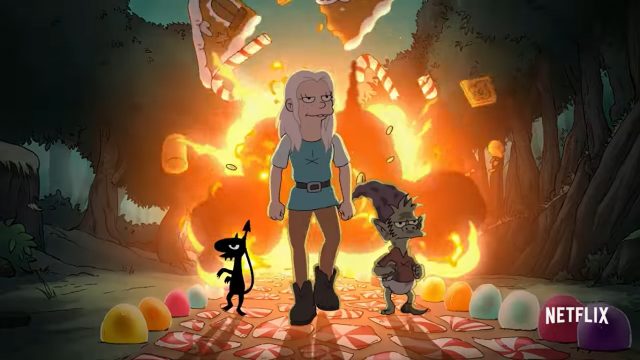Disenchantment, the latest series by The Simpsons and Futurama creator Matt Groening, has been getting fairly consistent reviews: the first seven episodes blow, and the final three are ridiculously good. What’s interesting to me is that the way it blows then rules is actually very old-fashioned for TV, and has left me questioning both my personal relationship to TV and the general cultural moment. As The Ploughman pointed out in discussion on the show, Futurama also had a meandering opening season and didn’t receive such a lukewarm response. Now, I think Futurama‘s opening season was at least technically much better – even when early Futurama was off-base, it was still generally funnier and more densely packed than Disenchanted – but I think he has a point in that our collective standards seem to have risen. This is not a world in which shows are expected to suck on toast for three seasons before becoming awesome, like Star Trek: The Next Generation famously did.
(Exception: Agents Of SHIELD. Everything I hear about that show makes it sound like a massive throwback, though, so it seems appropriate)
I’m too young to have experienced Nineties TV internet fandom, but I have heard stories; there was a general understanding amongst the more wizened that it takes shows a little while to kick into gear, as actors and writers and directors all figure out what they’re doing and how they can work together. My formative internet critical experience was, mostly, in the webcomic scene, which had a similar expectation rooted in the fact that the artform was mostly powered by self-taught amateurs working for free e.g. in my opinion my beloved 8 Bit Theater takes about thirty strips to really coalesce. One thing that makes my experience different is that webcomics very quickly set up the expectation that the creator would interact with and respond to their fanbase in real time; I assume this had at least some effect on my views on auteur theory, of strongly associating artworks with a single personality.
My point with all this being that my approach to art in general is to hang back and figure out for myself what someone previously would have said outright – what are the things the person making this does and does not care about? What’s the overall narrative goal? What are the smaller narrative goals? Once all those questions are answered, only then does the question become “am I willing to follow along?”, or to put it another way “are my goals as a viewer aligned with the goals of this show?”. This is an extremely rare situation where most people’s approach is actually more abstract than mine – most people just ask “do I like this?”
TV is much more sophisticated than it was even fifteen years ago (also: there’s more of it), which in a practical sense means that people’s standards are higher – you create “And Maggie Makes Three”, and now other shows have to live up to that, and that’s how you get Bojack Horseman – which in turn means shows have to hit the ground running. There’s room in my question for a show to take its time really delivering larger structural elements so long as there’s a central plank for me to grasp onto; there’s not nearly as much room in ‘do I like it?’. I’m not saying that’s a bad thing – there’s no reason people should watch something they don’t want to watch – but, having fond memories of seeing artists grow from nothing, I can’t help but mourn the loss of a romantic image in television.
Swinging this all back around to Disenchantment, all of this relates in that the show’s meandering suddenly giving way to a ridiculously epic plot really actually took me back to that. I’m absolutely certain that the show’s creators were deliberately holding back their ambitions for the sake of creating a zero-to-a-hundred effect, but seeing the potential in a story pay off, first gradually as the cast and crew got used to each other, then suddenly in the form of plot, isn’t something we see in quite this way anymore. It’s hard not to resent Groening for apparently not learning anything from thirty years of television – or worse, for thinking he had enough goodwill built up to waste our time – but it’s hard not to feel the romance again.

